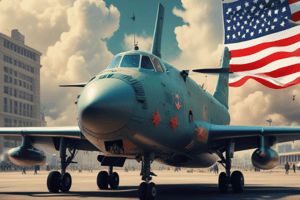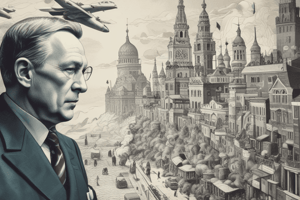Podcast
Questions and Answers
Match the following US strategies with their goals:
Match the following US strategies with their goals:
Containment policy = To promote democracy and prevent the spread of communism Truman Doctrine = To provide economic and military aid to countries threatened by communism Marshall Plan = To promote US economic influence and globalization NATO formation = To counter Soviet Union's military power
Match the following events with their purposes:
Match the following events with their purposes:
Bretton Woods System = To establish the US dollar as the global reserve currency GATT = To reduce trade barriers and promote free trade IMF and World Bank formation = To promote US-led economic development and stabilization CIA-backed coup in Iran = To overthrow a democratically-elected government to secure oil interests
Match the following military interventions with their locations:
Match the following military interventions with their locations:
Bay of Pigs invasion = Cuba Vietnam War = Southeast Asia CIA-backed coup in Iran = Iran Gulf War = Not mentioned in the passage
Match the following characteristics with the correct entity:
Match the following characteristics with the correct entity:
Match the following criticisms with the correct entity:
Match the following criticisms with the correct entity:
Match the following events with their years:
Match the following events with their years:
Match the following organizations with their purposes:
Match the following organizations with their purposes:
Match the following companies with their characteristics:
Match the following companies with their characteristics:
Flashcards are hidden until you start studying
Study Notes
United States Modern Expansion and Imperialism: Post World War II
Cold War and Containment (1945-1991)
- The US emerged as a superpower after WWII, with a goal to prevent the spread of communism and promote democracy
- Containment policy: US strategy to counter Soviet Union's influence through economic, military, and diplomatic means
- Key events:
- Truman Doctrine (1947): US committed to providing economic and military aid to countries threatened by communism
- Marshall Plan (1948): US provided economic aid to war-torn Europe to prevent Soviet influence
- NATO formation (1949): US-led military alliance to counter Soviet Union's military power
Economic Expansion and Globalization
- US promoted free trade and economic globalization to expand its economic influence
- Key events:
- Bretton Woods System (1944): established the US dollar as the global reserve currency
- General Agreement on Tariffs and Trade (GATT) (1947): reduced trade barriers and promoted free trade
- International Monetary Fund (IMF) and World Bank formation (1944): promoted US-led economic development and stabilization
Military Interventions and Regime Change
- US military interventions and regime changes to promote its interests and contain communism
- Key events:
- CIA-backed coup in Iran (1953): overthrew democratically-elected government to secure oil interests
- Bay of Pigs invasion (1961): failed US-backed invasion to overthrow Fidel Castro's government in Cuba
- Vietnam War (1955-1975): US military intervention to prevent communist takeover in Southeast Asia
Rise of Multinational Corporations (MNCs)
- US-based MNCs expanded globally, often with US government support, to promote economic interests
- Key characteristics:
- MNCs operated across borders, often with significant economic and political influence
- Examples: ExxonMobil, General Motors, Coca-Cola, and IBM
Criticisms and Controversies
- US modern expansion and imperialism faced criticisms for:
- Promoting US interests over local needs and sovereignty
- Supporting authoritarian regimes and human rights abuses
- Exploiting natural resources and labor in developing countries
- Undermining international law and institutions
United States Modern Expansion and Imperialism: Post World War II
Cold War and Containment (1945-1991)
- The US emerged as a superpower after WWII with a goal to prevent the spread of communism and promote democracy
- Containment policy was a US strategy to counter Soviet Union's influence through economic, military, and diplomatic means
- Truman Doctrine (1947) committed the US to providing economic and military aid to countries threatened by communism
- Marshall Plan (1948) provided economic aid to war-torn Europe to prevent Soviet influence
- NATO formation (1949) established a US-led military alliance to counter Soviet Union's military power
Economic Expansion and Globalization
- The US promoted free trade and economic globalization to expand its economic influence
- Bretton Woods System (1944) established the US dollar as the global reserve currency
- General Agreement on Tariffs and Trade (GATT) (1947) reduced trade barriers and promoted free trade
- International Monetary Fund (IMF) and World Bank formation (1944) promoted US-led economic development and stabilization
Military Interventions and Regime Change
- The US military interventions and regime changes were made to promote its interests and contain communism
- CIA-backed coup in Iran (1953) overthrew a democratically-elected government to secure oil interests
- Bay of Pigs invasion (1961) was a failed US-backed invasion to overthrow Fidel Castro's government in Cuba
- Vietnam War (1955-1975) was a US military intervention to prevent communist takeover in Southeast Asia
Rise of Multinational Corporations (MNCs)
- US-based MNCs expanded globally, often with US government support, to promote economic interests
- MNCs operated across borders, often with significant economic and political influence
- Examples of MNCs include ExxonMobil, General Motors, Coca-Cola, and IBM
Criticisms and Controversies
- US modern expansion and imperialism faced criticisms for promoting US interests over local needs and sovereignty
- Supporting authoritarian regimes and human rights abuses
- Exploiting natural resources and labor in developing countries
- Undermining international law and institutions
Studying That Suits You
Use AI to generate personalized quizzes and flashcards to suit your learning preferences.




